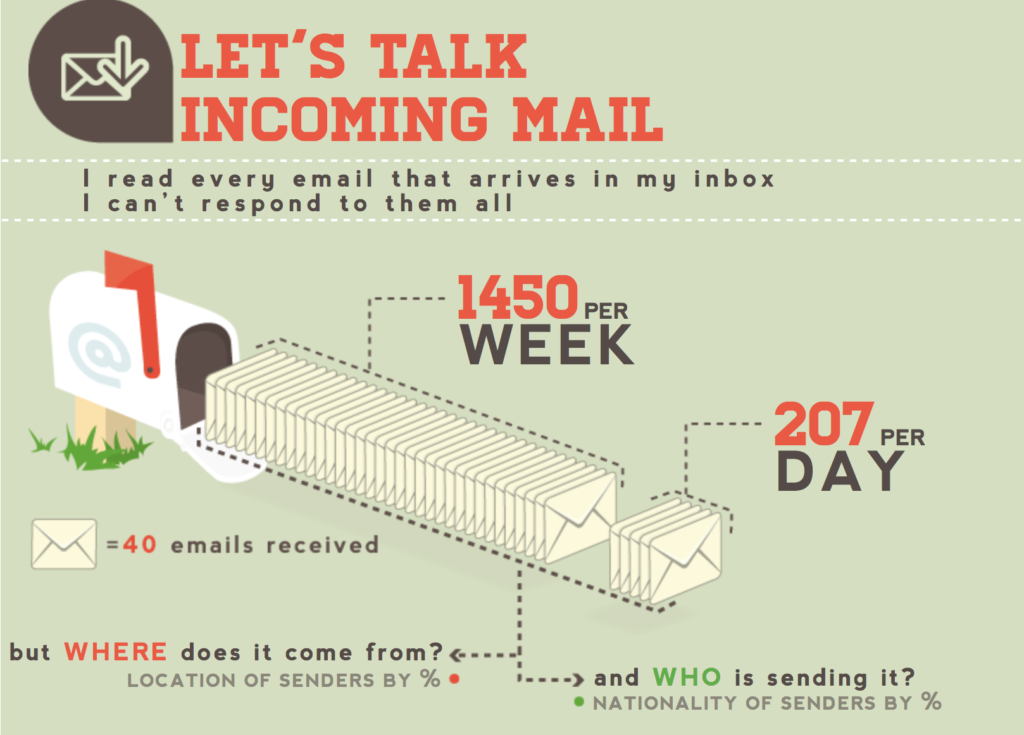
There are many factors driving a successful blog: high-quality content, engagement, social media traffic, search engine traffic, domain authority and more. I focused on all of those and attracted hundreds of visitors to blog, but did that make my blog a success? Nope. Here’s what made my blog successful:
Serve Your Audience
Focusing too much on SEO and metrics can lead to overlooking the most important part of your blog: your audience. Serve your audience and you’ll build a loyal following. I’ve heard this advice a hundred times over.
While it’s valuable advice, it has become a bit overrated. Don’t get me wrong. Serving my audience has helped a lot, but it’s only piece of the puzzle. Serving your audience means being attuned to their needs and interests, and creating valuable content accordingly.
But in a world filled with good content, writing more of it just isn’t enough. To truly serve your audience, you’ve got to do more. Think of content as an appetizer in a three course meal.
A Recipe for Success
Some bloggers mistakenly think success is a numbers game. But traffic and visitors alone won’t propel you to the top. Some blogs thrive because they enjoy hundreds of thousands of visitors while others struggle with that kind of traffic, or any kind of traffic for that matter.
But the real winners are the bloggers who truly LOVE their readers. I’m talking about the bloggers who, in addition to offering valuable content consistently, nurture their communities. They make themselves available by regularly answering readers’ questions, responding to their comments and engaging with their content.
If you view everyone in your audience as little more than a potential customer, your blogging journey will hit a lot of bumps. View each member of your audience as a human being with something to offer besides a pocket full of money.
Go Above And Beyond
You should already be going above and beyond with your content. But you should also strive to go the extra mile with your audience by acknowledging and showing appreciation for their support, and offering your own.
Writing alone doesn’t do that. Acknowledge your audience by engaging with their social media posts, responding to their emails and thanking them for sharing your content. Always try to be available.
Neil Patel writes some of the longest SEO related blog posts known to mankind. I’m sure he’s written at least a few posts that exceed 10,000 words. He also spends a lot of time marketing himself.
One would think a busy man like Neil would have little time to dedicate to his audience. But that’s actually where he dedicates most of his time. According to an infographic on his blog, Neil receives around 207 emails every day. He responds to 91 of them!

Neil spends four hours a day going through his inbox and responding to anything from business questions to interview requests. He also makes the time to respond to readers’ comments on his blog posts, which easily attract 100’s of comments! His older posts consistently receive engagement as well.
Make Your Audience Part Of The Action
For a long time, I saw guest blogging as a personal opportunity but hesitated to accept guest posts for my own blog. Yet the benefits of opening your blog to guest contributors are many. It saves you time, keeps your content fresh and varied, helps increase your traffic and adds value.
Not only that, guest contributors become part of your story.
I have written many guest posts. Two that stand out were for Jeff Bullas’ Blog and ProBlogger. When I first started out, these blogs were the holy grail of blogging and social media, so I read them every day to learn more about my niche. Once I gained experience and expertise, it was an honor to be given the opportunity to contribute to these blogs.
Contributors inevitably have different motivations for writing guest posts. Some enjoy seeing their name on a credible blog (and potentially building their own brand), others enjoy giving back to the blogs they’ve learned from in the past. But every contributor becomes a small part of the blog’s story, of your story.
As an added bonus, you get a backlink. You can also do something similar on YouTube by recording collaborative videos with audience members.
Don’t Oversell
Overselling to your readers is a surefire way to make the relationship sour. You may be overselling if you are:
- Creating products in bulk.
- Involved in affiliate marketing.
Of course, some people who create products into bulk and/or engage in affiliate marketing don’t fall into this trap. The danger arises when you’re too heavily promoting a product (yours or an affiliate’s) every month. I made this mistake.
I first got involved with promoting other people’s courses in 2015. The first time I promoted someone else’s course to my email list I got a bunch of sales. The next month, I promoted a different course and got a bunch of sales. The following month, I did the same.
I spend five straight months promoting other people’s products and very little time delivering value. The result? Increased unsubscribes, fewer email opens, and fewer clicks. It was an email marketing nightmare. My email list is still somewhat scarred by the aftermath but my open and clickthrough rates are gradually increasing.
The point is I enjoyed increased revenues initially, but eventually my sales and email subscribes took a hit. Why? Because I was too focused on pushing products and not providing anything of free value. Worst of all, I saw my email list as just that: a list. Nameless, faceless people with wallets.
It’s was a big mistake, and hard to admit, but if I can help you avoid making the same error I’ll be happy. In fact, I can thank one of my subscribers for helping me see the light. His email said, “You’re better than this.” And his sentiments were likely shared by the others on my list, the silent majority.
In Conclusion
While I still occasionally promote other people’s training courses, I am more focused than ever on my audience’s needs and interests, and giving them something of value that they can use.
Any successful blogger is successful because of his/her audience. Tenacity and grit factor in, but a blog is useless without a loyal following. If you love your readers, they will love you back (and will also be more open to trying your products and services in the future).
What are your thoughts on audience engagement? Do you believe there is a more important determinant of a blog’s success? Sound off in the comments section below.

Leave a Reply